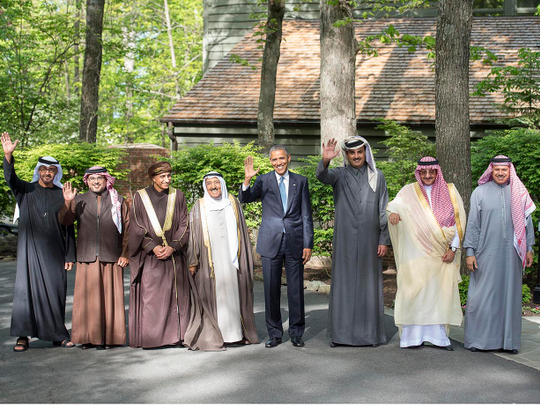
Riyadh: US President Barack Obama will meet with leaders from the Gulf Cooperation Council this week in Riyadh, Saudi Arabia.
The influence of the council, whose members are Bahrain, Kuwait, Oman, Qatar, Saudi Arabia and the UAE, has grown across the Middle East since the Arab Spring, and these countries have tried to counter what they view as an increasingly assertive Iran.
Here are some of the issues likely to be on the agenda when Obama and the Gulf leaders sit down together.
Countering Iran: The Gulf states have been concerned that the nuclear deal struck last year has empowered Iran, their main regional rival, and has frayed their relations with the Obama administration. Iran’s recent missile tests have further infuriated the Gulf states. The UAE’s ambassador to the United States, Yousuf Al Otaiba, recently said that Iran remained “as dangerous as ever.”
The US has looked to reassure the council members with plans for a new missile defence infrastructure and cyberdefences. Persuading Gulf states to support the Iran nuclear deal is unlikely, but the Obama administration still hopes it can minimise their complaints about it.
Syrian civil war
The US relies heavily on council members, particularly Saudi Arabia, to provide money and arms to Western-backed rebel groups fighting the Syrian government and Daesh extremists.
The Gulf states want to increase international pressure on Syria’s President, Bashar Al Assad, to maintain a partial ceasefire that appears increasingly fragile and commit seriously to the current round of diplomatic talks in Geneva.
Conflict in Yemen
The Obama administration has quietly supported the Saudi-led coalition in Yemen against Iranian-backed Al Houthi rebels, providing intelligence, airborne fuel tankers and munitions.
The United States’ Arab allies have at times complained that the US support is insufficient, and comes with too many restrictions.
The mounting civilian death toll in Yemen has led to international criticism of how the Saudi-led coalition is carrying out its military operations as well as questions over US support for the war.
Fighting Daesh
Saudi Arabia and the UAE have been part of the international campaign against Daesh extremists since the summer of 2014, but their participation fell off as they became more deeply involved in the conflict in Yemen.
In February, Defence Secretary Ashton Carter announced that Saudi Arabia was “reinvigorating its commitment to the coalition air campaign” against Daesh targets in Iraq and Syria, and that it had agreed to “contributing in other critical ways on the ground.”
As the United States steps up its military campaign against Daesh after battlefield successes by Western-backed forces in Iraq and Syria, one point of discussion may be how the Gulf states can help thwart the expansion of Daesh in Europe, Libya and Afghanistan.
Regional security
Obama will most likely push the council members to bolster their military spending and take on even bigger military roles in the region so the United States does not have to. He also may have to address his recent description of America’s Gulf allies — and some Europeans — as “free riders.”
For their part, the Gulf states will want a strong reaffirmation of US security guarantees.
Oil prices and the economy
The sharp drop in the price of oil has hurt the Gulf states’ economies, leading to budget deficits and cuts in public spending in Saudi Arabia.
With young populations — a recent study found that more than half of Saudi Arabia’s population is under 25 — the Gulf states will need to create millions of jobs in the coming years.
Looking beyond the success of the UAE in becoming a financial and transportation hub, Obama may want to hear about plans to diversify the regional economy.












